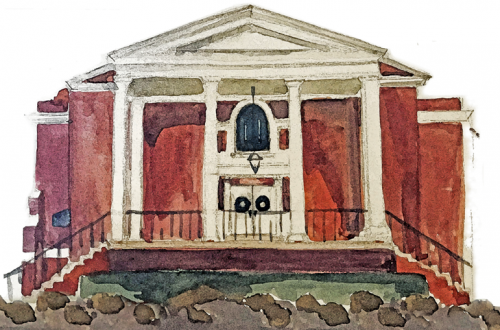 Albert Mohler delivered an important address on religious liberty at Brigham Young University today. Mohler’s remarks are notable for a number of reasons. I suppose what struck me most, however, is how he speaks respectfully and candidly about the profound differences between Christians and Mormons even as he addresses our common predicament. He writes,
Albert Mohler delivered an important address on religious liberty at Brigham Young University today. Mohler’s remarks are notable for a number of reasons. I suppose what struck me most, however, is how he speaks respectfully and candidly about the profound differences between Christians and Mormons even as he addresses our common predicament. He writes,
I am not here because I believe we are going to heaven together. I do not believe that. I believe that salvation comes only to those who believe and trust only in Christ and in his substitutionary atonement for salvation. I believe in justification by faith alone, in Christ alone. I love and respect you as friends, and as friends we would speak only what we believe to be true, especially on matters of eternal significance. We inhabit separate and irreconcilable theological worlds, made clear with respect to the doctrine of the Trinity. And yet here I am, and gladly so. We will speak to one another of what we most sincerely believe to be true, precisely because we love and respect one another.
I do not believe that we are going to heaven together, but I do believe we may go to jail together. I do not mean to exaggerate, but we are living in the shadow of a great moral revolution that we commonly believe will have grave and devastating human consequences. Your faith has held high the importance of marriage and family. Your theology requires such an affirmation, and it is lovingly lived out by millions of Mormon families. That is why I and my evangelical brothers and sisters are so glad to have Mormon neighbors. We stand together for the natural family, for natural marriage, for the integrity of sexuality within marriage alone, and for the hope of human flourishing.
Mohler also notes how the redefinition of marriage eventually undermines religious liberty for all of us who define marriage in the traditional way. But he also argues that the redefinition didn’t start with those demanding same-sex marriage rights. In my view, Christians would do well to understand this part of his argument. He writes,
We must note with honesty and candor that this moral revolution and the disestablishment of marriage did not begin with the demand of same-sex couples to marry. The subversion of marriage began within the context of the great intellectual shift of modernity. Marriage was redefined in terms of personal fulfillment rather than covenant obligation. Duty disappeared in the fog of demands for authenticity and the romanticized ideal of personal fulfillment. Marriage became merely a choice and then a personal expression. Companionate marriage was secularized and redefined solely in terms of erotic and romantic appeal—for so long as these might last…
The divorce revolution has not only made marriage a tentative, if not temporary, condition, it has redefined marriage as nothing more than a public celebration of an essentially and non-negotiably individual act of self-expression.
As Barbara Defoe Whitehead has observed, expressive marriage was followed almost instantly by expressive divorce. Divorce, like marriage, now becomes an expected act of self-expression for moderns, complete with greeting cards, celebrations, and public announcements of new erotic and romantic availability…
Heterosexuals did a very good job of undermining marriage before same-sex couples arrived with their demands. The marriage crisis is a moral crisis and it did not start with same-sex marriage, nor will it end there. The logic of same-sex marriage will not end with same-sex marriage. Once marriage can mean anything other than a heterosexual union, it can and must mean everything. It is just a matter of time.
Read the rest here.




7 Comments
Mary Gray Moser
Methinks we should obey civil authorities as long as civil law is not against God’s law, but, point #1, the church has no business trying to Christianize the government. Point #2: the Morman church is heretical, so what is a Christian leader doing joining with it?
Mary Gray Moser
After rereading the statements re: Mohler’s action, I think my response is not altogether appropriate. However, I am still not comfortable with Mohler’s action.
Chris Ryan
Wow, that was a Big Thought piece. Its a radical rejection of the last 60 yrs and if I’m understanding him correctly even the last 300 yrs. I may be misunderstanding him but it sounds as if he pines for the pre-Enlightenment institution of marriage. Now that’s nostalgic 🙂
He also seems to be making the case for an authoritarian, hierarchical, and organizational view of religious liberty. He seems to think religious liberty belongs to institutions, not to individuals. Since institutions have no soul & can’t go to heaven or hell, I find that a striking conclusion. But it does reflect pre-Enlightenment notions of religious liberty.
While I can agree that secular society has trivialized marriage today, I don’t think the past offers us much of a roadmap. My grandmother’s 2nd marriage was a beautiful 30yr run, but her 1st marriage was a violently abusive 20yr run. It ran 20yrs b/cs society frowned on divorce in the 1930s. She was only able to escape him by waiting until he went to work & then moving clear across the country. She was so scared of him that she didn’t even tell her friends she was leaving.
Chad A. Edgington
Mary, I have pretty strong feelings against Mormonism, but I do enjoy my visits with them when we meet and discuss things. When I read the transcript of the speech I kept thinking how it must have sounded to those young Mormons in the room. I’m sure some of his statements were shocking to them, but could such a speech prompt one of them to study the historic christian faith and discover the truth about mormonism?
Mary Gray Moser
Thanks, Chad.
Pingback:
Ian Shaw
Well said Mr. Mohler, well said.